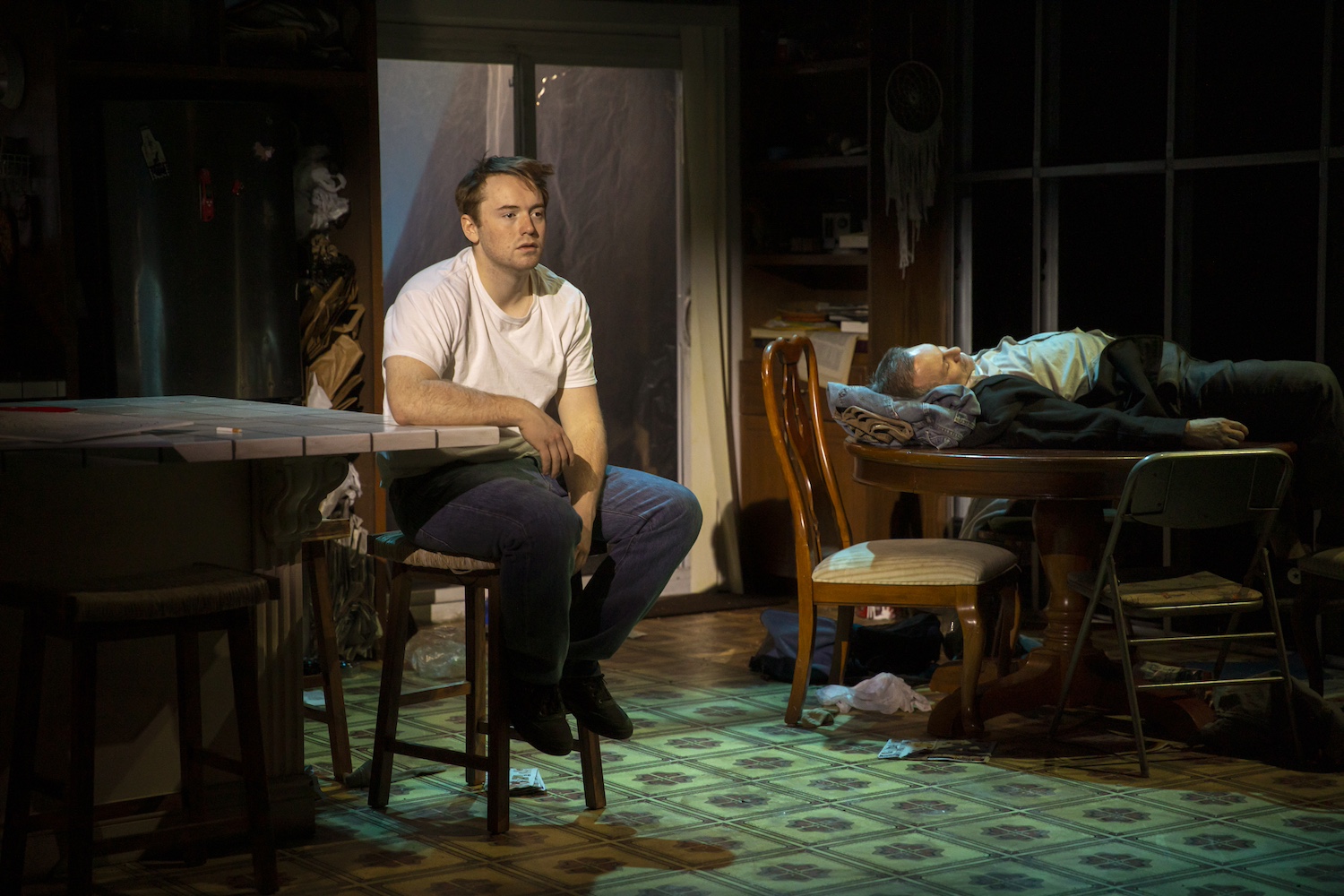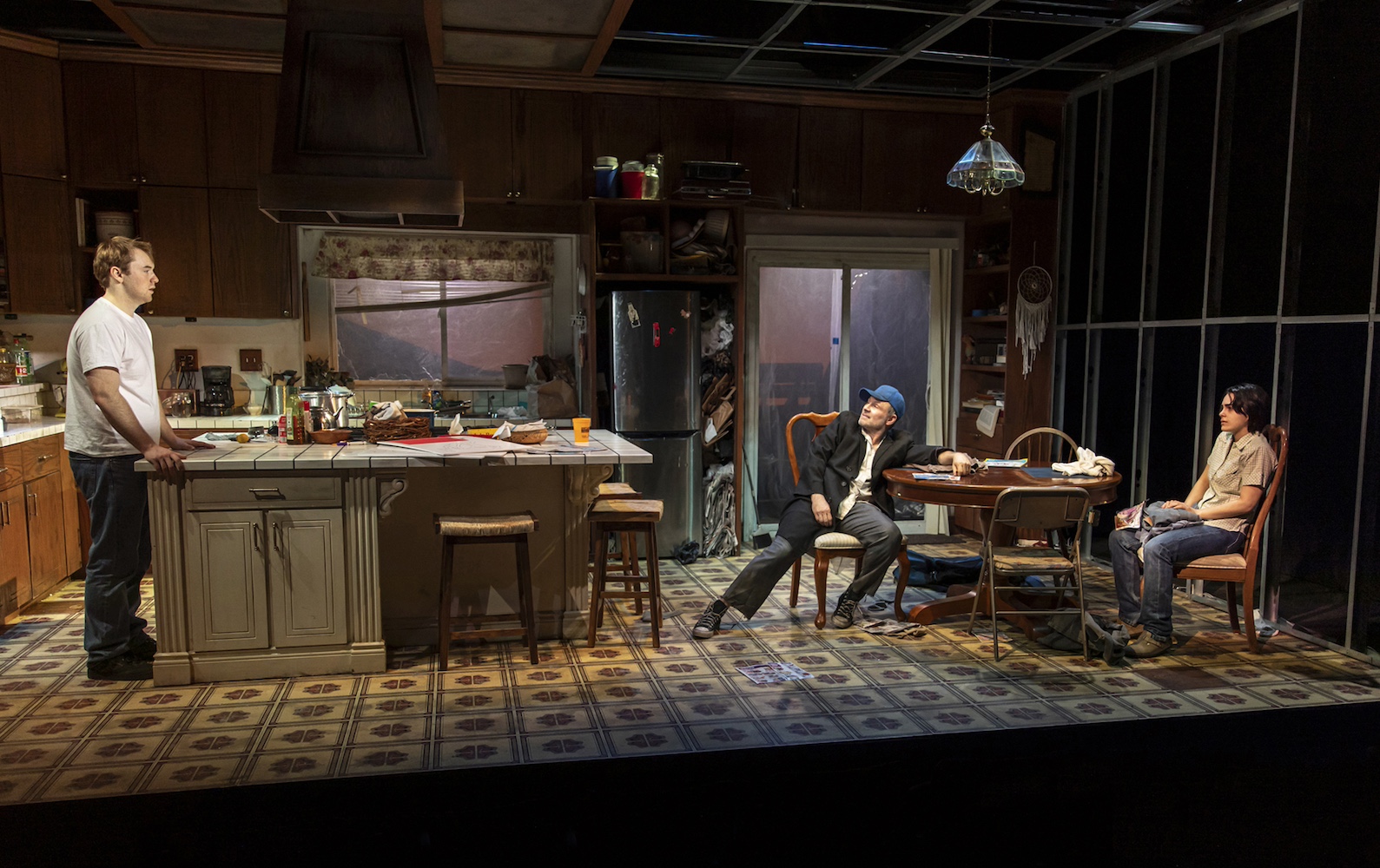(***/***** three stars out of five)
Here’s a tip: if you’re going to use live animals in your play as a prop, first make sure your production is solid and would be as easily enjoyed without the prop as with it. You don’t want it to end up being the most memorable part of the play—that’s not why you’re putting it on (unless, say, it’s about animals to begin with). But that’s exactly what happens in the New Group’s new Off-Broadway production of Sam Shepard’s classic Curse of the Starving Class, now playing at Romulus Linney Courtyard Theatre at The Pershing Square Signature Center.
The saving grace of great playwrights like Sam Shepard is that their powerful and poetic writing stands above even the most mediocre productions. His best plays are good under poor direction and outstanding with strong leadership. Unfortunately, this star-flecked version seems rudderless with the often excellent Scott Ellis (New Group’s artistic director) at the helm. One can only surmise where things went off-piste, but the play’s central characters, who should be recognizable as a family, albeit a severely dysfunctional and damaged one, all seem to be utterly detached, with the actors operating in their own silos.

The best of the bunch is the enigmatic movie star Christian Slater (Heathers, True Romance), who shines in the second act as the revived father, Weston Tate, who had drunkenly caused a tremendous amount chaos and damage prior to the play’s open—wherein we see his son Wesley (Cooper Hoffman, son of the late, great Philip Seymour Hoffman) sweeping up glass from a shattered sliding door. Slater’s almost too charming as the suddenly sober and productive Weston, whom we really shouldn’t like, but do—especially when he lovingly converses with the aforementioned charming sheep, Lois (a real, live California Red sheep), whose adorable behavior elicits probably too many “awws” from the audience (she’s a star and knows it). She’s in the house because she has maggots, which subtracts from her cuteness.

But, like the other plays in Shepard’s Family Trilogy (Buried Child and True West followed this one), one is quickly reminded that this is a textbook dysfunctional family. With the exception of Wesley, who craves familial bonding, they all want out, especially the mother, Ella (Calista Flockhart, best known for TV’s “Ally McBeal”), who has somehow been convinced by slick lawyer/con man, Taylor (Kyle Beltran), that she can sell the family’s rural 1970s California ranch house (effectively designed by Arnulfo Maldonado, except for a puzzlingly contemporary refrigerator) and surrounding property without Weston needing to co-sign. Ella has fantasies about taking the cash and moving with her children to Europe: “They have everything in Europe. High art. Paintings. Castles. Buildings. Fancy food.” Her delusions are especially amusing considering the amount of time every family member spends staring into the empty refrigerator and shouting at it as if it’s responsible for their hunger.
But even the young teen Ella (Stella Marcus) already wants out, as she describes in a gorgeously written (but weakly delivered) soliloquy in which she lives in Mexico as a mechanic and takes revenge on her mother and the lawyer who happen to have car trouble near her small roadside garage. Unfortunately, as with Flockhart, Marcus demonstrates little emotional range, so not only is her character’s darkly comic nuance lost in the performance, so is her pain and sense of betrayal by a family she desperately needs.

While it’s clear that the Tate family is in turmoil at present, we don’t get the impression (from the actors) they ever cared for each other or existed as a family (save for Hoffman’s Wesley, who also lacks emotional valence), which we should. Instead, there seems to be little history here. This is a directorial shortcoming, and Ellis should have made sure that the actors, despite their celebrity status, connected to each other on stage. They don’t.
But, like in many troubled households, there is often a pet in whom the emotionally deprived can find comfort and solace. And in this case, at least for a moment, it’s the sheep—and she plays her part perfectly. Thank goodness for Lois.
Curse of the Starving Class. Through April 6 at the Romulus Linney Courtyard Theatre at The Pershing Square Signature Center (480 West 42nd Street, between Ninth and Tenth Avenues). Presented by The New Group: www.thenewgroup.org












